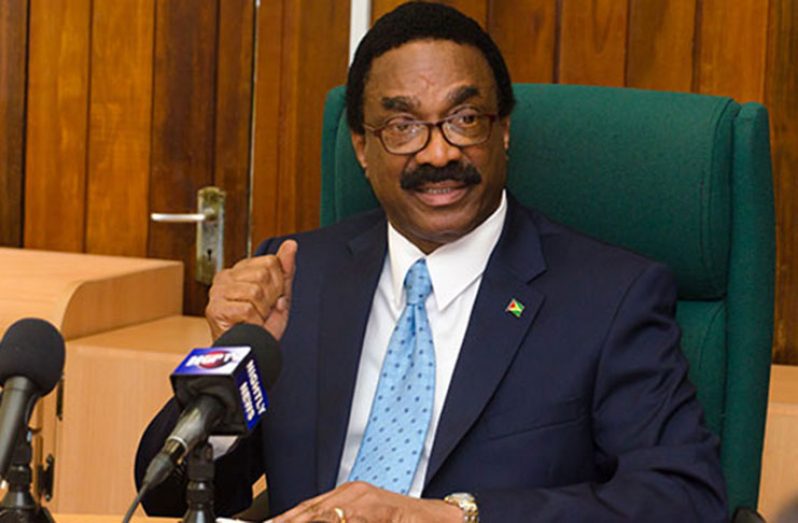— party insists MPs would not listen
THE government, backed by civil society, is urging the Opposition People’s Progressive Party/Civic (PPP/C) to return to the National Assembly to extend the period for the holding of elections in accordance with the Constitution.
Article 106 (7) of the Constitution allows for the three-month period for the holding of elections, subsequent to the passage of a No-Confidence Motion, to be extended by the National Assembly by a resolution supported by a two-thirds majority but the Opposition is refusing to return to the House.
On Saturday, the PPP said its Members of Parliament will not return to the National Assembly, pursuant to Article 106(7) of the Constitution, to support any extension of time for the holding of General and Regional Elections. It is demanding that elections be held by September 18.
But with the Guyana Elections Commission (GECOM) indicating that it is in no position to facilitate elections by September 18, Attorney-General and Minister of Legal Affairs, Basil Williams, said to return to the National Assembly would be to act in the best interest of the country.
Minister Williams, in a recent engagement with the press, explained that because the three-month period for the conduct of elections, following the passage of a no-confidence motion has elapsed, it is now for the parliamentary parties – the A Partnership for National Unity + Alliance For Change (APNU+AFC) and the People’s Progressive Party/Civic (PPP/C) – to return to the National Assembly and by a two-thirds majority vote, extend the time.
Like the Attorney-General, the Guyana Trades Union Congress (GTUC) believes that now is an opportune time for the parliamentary parties to return to the House.
“Both Opposition and Government must go back to Parliament to address Article 106 in its entirety. Respect for the CCJ’s ruling would see adherence to this…,” the GTUC implored the political parties in the House in a recent statement.
The trade union said it is well aware that returning to the National Assembly may appear as though one side is losing ground, but the situation should not be about losing ground but rather about saving Guyana and utilising law and order.
It noted that outside of GECOM, a constitutionally independent body, stating its readiness to holding election, the extant clause requires activation by “resolution supported by not less than two-thirds of the votes of all the elected members of the National Assembly to determine” if the three-month timeframe cannot be met.
“Government and Opposition must return to the Assembly to give effect to this clause,” the union urged while questioning “why there is no effort to seek a constitutional resolution as instructed by the CCJ as opposed to a political one with the potential for conflict.”
According to GTUC, Guyana can take the example of political patience and respect for the Rule of Law being faithfully exhausted in other societies.
“Take the United States (U.S) and United Kingdom (U.K) for instance, they are utilising the Judiciary and Legislature to resolve serious differences with the President Donald Trump administration, and leaving the European Union as with the UK. As we watch and see the methodical and patient pursuit and execution of the law, why aren’t our politicians learning and adopting these best practices of resolution of conflict. This nation must not be torn apart every time there is political difference and the issue of election comes up,” it reasoned.
Chartered Accountant Christopher Ram, backed by the Opposition, has moved to the High Court for an order to compel the Elections Commission to conduct elections by September 18, even as he challenges the ongoing House-to-House Registration.
But the Attorney-General has told the Court that the Caribbean Court of Justice – Guyana’s final appellate court – has already ruled on the No-Confidence Motion, and the pending elections and no such order was granted.
In ruling on the matter, the CCJ said Guyana’s Constitution stipulates that only the President, the National Assembly and, by extension, GECOM can dictate the precise timing of the elections. President of the CCJ, Justice Adrian Saunders, said it would not be correct for the Court, by the issuance of coercive orders or detailed directives, to instruct these bodies on how they must act.
“It is not, for example, the role of the Court to establish a date on or by which the elections must be held, or to lay down timelines and deadlines that, in principle, are the preserve of political actors guided by constitutional imperatives. The Court must assume that these bodies and personages will exercise their responsibilities with integrity and in keeping with the unambiguous provisions of the Constitution bearing in mind that the no-confidence motion was validly passed as long ago as 21 December 2018,” Justice Saunders explained.












